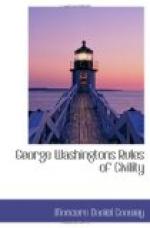Concerning the source of these remarkable Rules there have been several guesses. Washington Irving suggests that it was probably his intercourse with the Fairfax family, and his ambition to acquit himself well in their society, that set him upon “compiling a code of morals and manners.” (Knickerbocker Ed. i. p. 30.) Sparks, more cautiously, says: “The most remarkable part of the book is that in which is compiled a system of maxims and regulations of conduct, drawn from miscellaneous sources.” (i. p. 7.) Dr. Toner says: “Having searched in vain to find these rules in print, I feel justified, considering all the circumstances, in assuming that they were compiled by George Washington himself when a schoolboy. But while making this claim it is proper to state, that nearly all the principles incorporated and injunctions, given in these 110 maxims had been enunciated over and over again in the various works on good behaviour and manners prior to this compilation and for centuries observed in polite society. It will be noticed that, while the spirit of these maxims is drawn chiefly from the social, life of Europe, yet, as formulated here, they are as broad as civilization itself, though a few of them are especially applicable to Society as it then existed in America, and, also, that but few refer to women.”
Except for the word “parents,” which occurs twice, Dr. Toner might have said that the Rules contain no allusion whatever to the female sex. This alone proved, to my own mind, that Washington was in nowise responsible for these Rules. In the school he was attending when they were written there were girls; and, as he was rather precocious in his admirations, a compilation of his own could hardly omit all consideration of conduct towards ladies, or in their presence. There were other reasons also which led me to dissent from my friend Dr. Toner, in this instance, and to institute a search, which has proved successful, for the source of the Rules of Civility.
While gathering materials for a personal and domestic biography of Washington,[1] I discovered that in 1745 he was attending school in Fredericksburg, Virginia. The first church (St. George’s) of the infant town was just then finished, and the clergyman was the Rev. James Marye, a native of France. It is also stated in the municipal records of the town that its first school was taught by French people, and it is tolerably certain that Mr. Marye founded the school soon after his settlement there as Rector, which was in 1735, eight years after the foundation of Fredericksburg. I was thus led to suspect a French origin of the Rules of Civility. This conjecture I mentioned to my friend Dr. Garnett, of the British Museum, and, on his suggestion, explored an old work in French and Latin in which ninety-two of the Rules were found. This interesting discovery, and others to which it led, enable me to restore the damaged manuscript to completeness.
[Footnote 1: George Washington and Mount Vernon. A collection of Washington’s unpublished agricultural and personal letters. Edited, with historical and genealogical Introduction, by Moncure Daniel Conway. Published by the L.I. Historical Society: Brooklyn, New York, 1889.]




